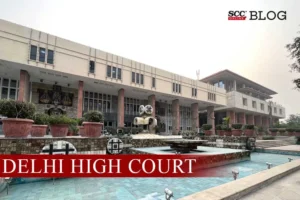Delhi High Court: A petition was filed seeking directions to the Respondents to release the compensation for which the Petitioner is entitled to under the Mukhyamantri Covid-19 Pariwar Aarthik Sahayata Yojana (MCPASY). Subramonium Prasad, J., directs respondent 3 i.e., the SDM to promptly release the ex-gratia payment under the MCPASY Scheme to the petitioner within two weeks from the date of order.
The spouse of the petitioner fell ill with a fever on 19-04-21. Despite testing negative for COVID-19 in the RT-PCR test, his fever persisted. On 22-04-21, he underwent a chest CT scan which revealed abnormalities with a CT Severity Score (CTSS) of 10/25. Due to breathing difficulties, he was admitted to the Sardar Patel COVID Care Centre in Delhi on 25-04-21 and discharged on 26-04-21. Subsequently, on 27-04-21, he was admitted to Pulse Hospital in Kotputli, and then transferred to Eternal Hospital in Jaipur on 28-04-21. It was on 28-04-21 that he tested positive for COVID-19. A second CT scan on the same day showed severe lung involvement with a CTSS of 25/25. He remained in Eternal Hospital until his unfortunate demise on 19-06-21. The petitioner applied for compensation under a scheme providing financial aid to families of COVID-19 victims. However, their application was not considered. Consequently, they have filed this petition seeking relief from the court. The counter affidavit filed by SDM (respondent 3) argued that the petitioner was not entitled to the benefit of the MCPASY Scheme because her husband’s death occurred more than one month after testing positive for COVID-19.
Counsel for the petitioner submitted that the husband was admitted to the hospital due to the aftereffects of COVID-19 and ultimately passed away due to complications from the virus. They cite the death summary report issued by the Eternal Hospital, which attributes the cause of death to COVID-19. He further referred to a circular issued by the Ministry of Home Affairs and guidelines from the Government of India, Ministry of Health & Family Welfare, and Indian Council of Medical Research suggesting that a patient who continues in the hospital for more than 30 days and subsequently dies should be treated as a COVID-19 death. Counsel for GNCTD submitted that the cause of death was cardiac arrest and that the husband’s death occurred beyond the one-month period stipulated by the MCPASY Scheme. Thus, the husband’s name did not appear on the list of deaths due to COVID-19.
The Court noted that the perusal of the death summary issued by the Eternal Hospital disclosed that the husband of the Petitioner had contracted COVID-19 and was admitted into the hospital and remained admitted till his death, i.e., 19-06-2021. The death summary categorically points out that the Petitioner had contracted COVID-19, and suffered after-effects of COVID-19, never improved and ultimately passed away on 19-06-2021. Just because the ultimate cause of death is shown to be cardiac arrest does not mean that the husband of the Petitioner did not pass away due to the complications arising out of COVID-19.
In Gaurav Kumar Bansal v. Union of India, 2021 SCC OnLine SC 3384, the Supreme Court while issuing directions regarding grant of ex-gratia assistance to the kith and kin of the persons who passed away due to COVID-19 observed that Covid-19 cases considered for assessing deaths are those diagnosed through positive RT-PCR/Molecular Tests/RAT or clinically determined by a treating physician in a hospital/in-patient facility. The Court also noted that the Government of India, in collaboration with the Ministry of Health & Family Welfare and the Indian Council of Medical Research released comprehensive guidelines for the classification and documentation of COVID-19-related deaths that outlines a scenario-based approach to identify COVID-19 deaths, including cases where patients have died in hospital settings or at home, as long as a Medical Certificate of Cause of Death (MCCD) has been issued. Notably, deaths occurring within 30 days of testing positive or being clinically determined as COVID-19 cases are also considered COVID-19 deaths, even if they happen outside medical facilities.
The Court observed that as per these guidelines, a district-level committee is to be established to address cases where MCCDs are unavailable or where the next of kin are dissatisfied with the cause of death listed. This committee examines petitions, verifies facts, and issues Official Documents for COVID-19 Death, ensuring transparency and accountability in the reporting process. Furthermore, the guidelines emphasize timely processing, stipulating that applications for Official Documents for COVID-19 Death and grievance redressal must be handled within 30-days of submission. This ensures efficient resolution and documentation, maintaining the integrity of COVID-19 mortality data. Overall, the guidelines provide a structured framework for accurately identifying and documenting COVID-19 deaths, promoting transparency and consistency in the reporting process across states and union territories in India.
The Court remarked that the facts of the present case clearly show that the husband of the Petitioner herein had contracted COVID-19 and was admitted in the hospital on 25-04-2021 and his health condition did not improve thereafter and he passed away after two months in the hospital itself only due to COVID-19 complications, a fact which is evident from the medical certificate of the cause of death issued by the hospital.
Thus, the Court directed respondent 3 to release the sum of exgratia payment under the MCPASY Scheme to the Petitioner herein forthwith within a period of two weeks from the date of order.
[Nishu Jain v GNCTD, 2024 SCC OnLine Del 862, decided on 06-02-2024]
Advocates who appeared in this case :
Mr. Sunil Dalal, Sr. Advocate with Mr. Harsh Khanna, Mr. Vivek Jain, Mr. Mahabir Singh, Mr.Nikhil Beniwal, Ms. Manisha Saroha, Ms. Aastha Tiwari, Ms. Tulasi Mukhi and Mr. Navish Bhati, Advocates for petitioner
Mr. Satyakam, ASC for GNCTD

